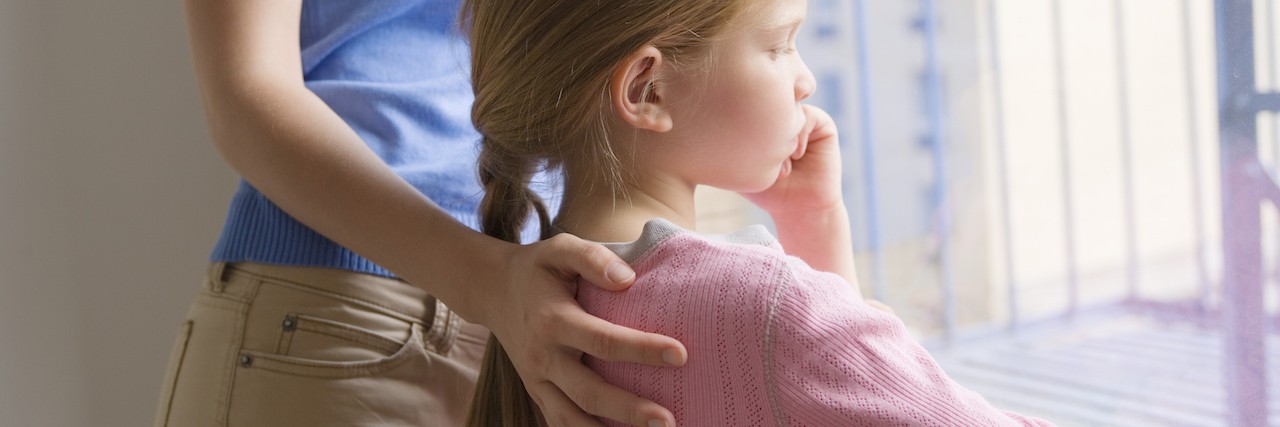I Didn't Recognize My Child's Anxiety Because It Was Different Than My Own
My daughter is a beautiful compassionate, empathetic child who was diagnosed with generalized anxiety disorder (GAD). When it was first suggested to me, I thought nothing of it and blew it off. My daughter was 5. She was just acting like any other 5-year-old, whiny, maybe a bit emotional. At age 6, her doctor brought it to my attention again, saying her fear of doctors was more than just “white coat syndrome.”
This was said as my daughter was screaming and crying, sounding like someone was severely hurting her as she sat alone on the examining table, more than an arm’s length away from the doctor and myself. I really looked at her. She was petrified. Maybe this wasn’t normal. Maybe this was out of the ordinary for a 6-year-old. I took the diagnosis and ran home with it.
Since I’ve been diagnosed with GAD myself, I was outright curious why our symptoms manifested completely differently. As an adult, my GAD usually starts with tension in my shoulders and hands, then hyperventilation, dizziness, nausea, brain fog and lack of concentration. My daughter exhibited none of these except the nausea, which I wrote off as a typical child who wanted attention. Mom won there.
I sat at the computer and entered “childhood generalized anxiety symptoms” into Google and was amazed by the responses. What I came to realize is childhood anxiety is completely different than adult GAD. Symptoms included excessive worrying about almost everything.
“What if we’re late mommy?”
“What if I forget my homework mommy?”
“What if I get sick mommy?”
This worry could not be easily explained away. There was nausea, which would explain why my daughter constantly complained about her stomach hurting. Then there was the extreme focus and fear on real life issues. Within seconds, she would be crying about getting certain diseases she believed were tangibly within reach.
The best example was the 2014 outbreak of Ebola. She had overheard about a doctor who had it and was being treated in New York. We were going into New York City for a day during her spring break. She shook, tears streaming down her face, yelling at the top of her lungs that she didn’t want to go because she was going to catch Ebola. This panic attack lasted for over an hour, many times within a few weeks. Even after we told her the doctor was cured, she still panicked. Our day in New York was almost canceled, until I finally was able to talk her down back to reality.
She went through the same panic thinking she would catch a lisp that a new student had at school and another time when she thought she would catch her classmate’s bloody nose. During all this, she was in therapy and seeing the school psychologist trying to learn coping techniques for an illness that seemed so foreign to me, even though I shared this diagnosis.
Last summer was the last time I remember the panic returning to her. Therapy had helped her cope and I finally began not to tiptoe around her, avoiding sparking an attack. We were camping with family when two dogs came through, one with a collar, one without. A family member had found rope and was able to leash them. My daughter and her cousin were petting them.
Turns out these dogs belonged to the campsite’s neighbors but the job was already done. As soon as this family member mentioned the word “rabies,” my daughter lost it. Panic set in. We were thrown back into the zone of involuntary shaking, tears and banshee shrieking.
“Mommy, do I have rabies?”
“No sweetie. Did the dog bite you? Are you bleeding?”
“No, but I pet it. It’s saliva is on me.”
“If you are not bleeding, then you are fine. Besides the dogs are not wild. Their owners are picking them up now. They’ve had their rabies shots.”
This may have worked and quieted her fears if said family member had not started mocking my daughter for it. As a nurse, this person had the knowledge of what care would be necessary if someone were to contract rabies. Then, said person started antagonizing my daughter about the quantity of shots that would be needed and what could happen if you didn’t receive those shots in time. I am not sure why this adult felt the need to instigate my 8-year-old daughter but because of that, this panic attack lasted more than an hour.
I wish I knew. I wish I knew the symptoms she exhibited at age 5, some earlier, were actually a disorder. I wish I didn’t think it was just typical child behavior. For more than a year, she could’ve been getting treatment but because her reactions were very different from mine, I brushed off the GAD diagnosis.
It is bad enough there is such a strong stigma for adult mental illness, but what about children? I didn’t even realize a child could suffer from a mental illness before my child was diagnosed. I wish her doctor had pointed us to more resources than just child therapists. I wish they had given me website links, printed articles and books to read. Now, I know. I know how to help her if this beast returns and can now help others whose children may have GAD as well.

